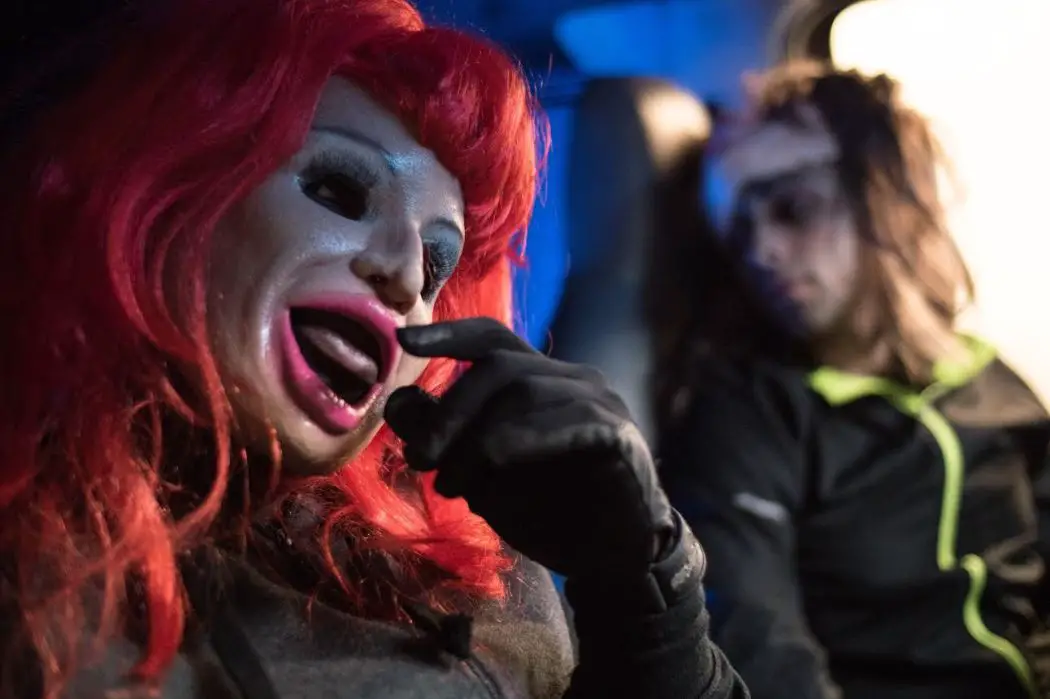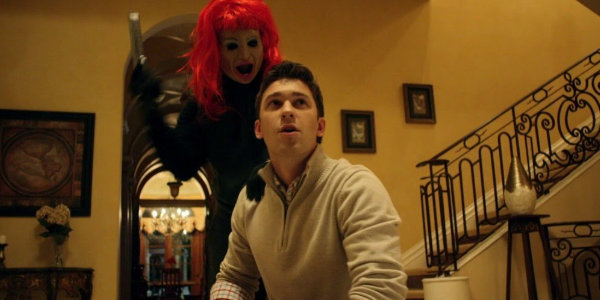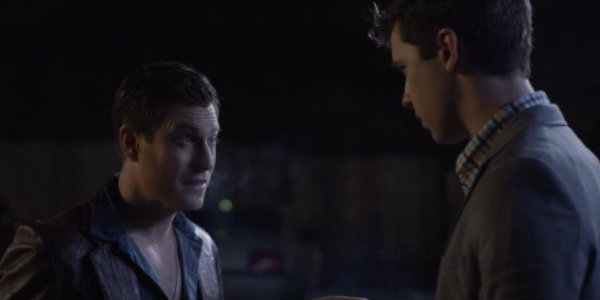GET THE GIRL: Romantic Digressions Amid Gunfire

English Major, Film Buff, and Citizen of the World, Sean…
Get the Girl sees frequent genre filmmaker Eric England tackling the terrain of the action blockbuster in the same vein as Die Hard or Point Break. Its primary aim is to situate itself in a tradition of high-octane thrillers that bear a consistently self-referential penchant for ironic bravado. Its characters are sparsely drawn in order for the viewer to more easily imagine themselves in a similar situation, and the violence that follows is rendered via a bizarre turn of events that feels emotionally plausible. Even when the individual players spout unbelievable catch phrases that highlight their contrived natures, the audience should be having such a good time giving into the escapist content that realism is willingly surrendered to daydream.
But England never really gets very far in establishing his characters’ basic motivations before introducing a wildly unlikely action blockbuster scenario. Instead, Get the Girl toys with a fairly charming boy meets girl scenario – wherein a wallflower romantic named Clarence (Justin Dobies) pines after a put-upon bartender named Alexandra (Elizabeth Whitson) – before bringing central antagonist and notorious playboy Patrick (Noah Segan) in to abruptly careen the entire film towards explosive chaos.
The sliver of subjective projection that causes Clarence to set the entire shebang off is intriguing, but the rest of Get the Girl sorely misses the potential of its underlying dramatic conceit. Instead, England revels in blistering sequences of offensive tension that lack any core sentimentality inherent to movies like Die Hard and Point Break.
At the Altar of John McTiernan
Die Hard is a largely undisputed classic of the American action-thriller genre for good reason. Director John McTiernan truly broke the mold in the late 1980s with a film that is still among the most frequently cited movies of its genre. In the years since initial release, Bruce Willis as John McClane has found himself at the center of a franchise with the legs to outlast its Hollywood leading man, even as the most recent entries in the series have been met with less than enthusiastic returns from both critics and general audiences alike.

At the heart of Die Hard – and the movies like Get the Girl that it has directly inspired – is a good old fashioned bit of melodrama. John McClane wants desperately to reunite with his wife on Christmas Eve, but soon finds himself at the center of a tense, violent hostage negotiation with a band of armed terrorists. Rapid bursts of comedy set against grand action movie set pieces ensue, and you have the making for the quintessential action movie that guys will continue to profess to be their favorite holiday movie of all time forever.
But in England‘s hands, all of the taut human sentimentality that’s in abundance throughout McTiernan‘s effortless masterpiece is lost to a pale imitation of what makes Die Hard so great. Clarence is a sympathetic loser, but Get the Girl doesn’t really take the time to really explore his situation far enough before placing him in the role of a John McClane type in an unoriginal hostage scenario of his own making.
England obviously understands all of the narrative beats and technical feats that are typically achieved over the course of a blockbuster action movie production, but loses sight of his own story in an effort to self-consciously allude to all of the great movies like Get the Girl that have come before.

Featuring several characters that feel as though they were lifted wholesale from Die Hard and its progeny, Get the Girl is an action movie that is obsessed with the idea of an action movie, but not with actually being one. Gone are any relatable characters, and in their place is a set of easy caricatures and a bland conceit from which all of the mayhem predictably arises. Despite hosting the on-screen talent of contemporary action movie producer royalty Adi Shankar, Get the Girl never moves far beyond the shallow waters of post-modern deconstruction.
Conclusion
Clarence and Alexandra form the sympathetic heart of Get the Girl, and their story is intriguing enough to compel the viewer to stick around long enough to see the final credits roll. Possessed of all the romantic idealism that has proven to be the dramatic vitalism of several romantic comedies in the past, Clarence sets about constructing his very own boy meets girl scenario. At times, England is able to carefully get at some of the narcissism inherent to Clarence’s unrequited love affair with a girl that he only knows from afar, but Get the Girl loses sight of this perennial tragedy amid the gunfire of his surrounding action blockbuster.
For all of Clarence’s well-seeming advances upon both the viewer’s and Alexandra’s sentiments, his needling desires never really land anywhere compared to the far more obvious bouts of violent narrative exposition. The action movie conceit that serves to propel the movie forward is obviously England‘s strong suit, but is simultaneously the film’s most glaring undoing.
Die Hard successors like Point Break may have been able to examine the inner lives of iconoclastic casts of ne’er-do-well’s, but Get the Girl sorely overestimates its own respective ability to move past romantic digression and into the territory of real human drama.
What’s your favorite action movie? Do you prefer films of said genre to be self-referential comedies or straight-forward dramas?
Get the Girl saw release in the U.S. on January 27, 2017. Find international release dates here.
Does content like this matter to you?
Become a Member and support film journalism. Unlock access to all of Film Inquiry`s great articles. Join a community of like-minded readers who are passionate about cinema - get access to our private members Network, give back to independent filmmakers, and more.
English Major, Film Buff, and Citizen of the World, Sean K. Cureton is a born and raised Jersey Boy. Having received a B.A. in English from Rutgers University, Sean is proud to call the Garden State his home, equidistant from both the steps that made Sylvester Stallone a household name, and the park where Harry was cordially introduced to Sally, even if he’d prefer to a stay in state due to a certain fondness for a convenience store located in Leonardo, NJ. When he’s not in the multiplex, you can follow him on Twitter, @seankcureton.













